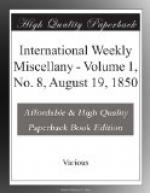* * * * *
“THE NIGHT SIDE OF NATURE[1]”, by Catharine Crowe, so well known as one of the cleverest of the younger set of literary women in England, we have already mentioned as in the press of Mr. Redfield; it is now published, and we commend it as one of the most entertaining and curious works that has ever appeared on the “wonders of the invisible world”. We quote from the judicious critic of the Tribune the following paragraphs in regard to it:
[Footnote 1: The Night side of Nature; or, Ghosts and Ghost Seers. By Catherine Crowe. New York. J.S. Redfield.]
“The author of this work is an accomplished German scholar. Without being a slave to the superstitious love of marvels and prodigies, her mind evidently leans toward the twilight sphere, which lies beyond the acknowledged boundaries of either faith or knowledge. She seems to be entirely free from the sectarian spirit; she can look at facts impartially, without reference to their bearing on favorite dogmas; nor does she claim such a full, precise and completely-rounded acquaintance with the mysteries of the spiritual world, whether from intuition or revelation, as not to believe that there may be more “things in heaven and earth than is dreamt of in our philosophy.” In this respect, it must be owned that she has not the advantage of certain religious journals in this city, like the Christian Inquirer and The Independent, for instance—which have been so fully initiated into the secrets of universal truth as to regard all inquiry into such subjects either as too vulgar for a Christian gentleman, comme il faut, or as giving a “sanction to the atheistic delusion that there may be a spiritual or supernatural agency” in manifestations which are not accounted for by the New-England Primer. Mrs. Crowe, on the contrary, supposes that there may be something worthy of philosophical investigation in those singular phenomena, which, surpassing the limits of usual experience, have not yet found any adequate explanation.
“The phrase ‘Night Side of Nature’ is borrowed from the Germans, who derive it from the language of astronomers, designating the side of a planet that is turned from the sun, as its night side. The Germans draw a parallel between our vague and misty perceptions, when deprived of the light of the sun, and the obscure and uncertain glimpses we obtain of the vailed department of nature, of which, though comprising the solution of the most important questions, we are in a state of almost total ignorance. In writing a book on these subjects, the author disclaims the intention of enforcing any didactic opinions. She wishes only to suggest inquiry and stimulate observation, in order to gain all possible light on our spiritual nature, both as it now exists in the flesh and is to exist hereafter out of it.




